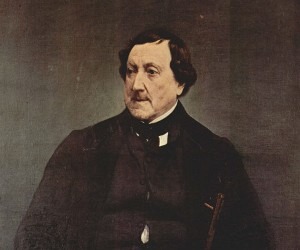 “Minors of the Majors” invites you to discover compositions by the great classical composers that for one reason or another have not reached the musical mainstream. Please enjoy, and keep listening!
“Minors of the Majors” invites you to discover compositions by the great classical composers that for one reason or another have not reached the musical mainstream. Please enjoy, and keep listening!
In 1829, Gioachino Rossini (1792-1868) completed his thirty-fourth opera, William Tell. Financially secure and at the height of his operatic career, Rossini spontaneously decided to retire. The compositional hyperactivity of his early life was now followed by almost four decades of inactivity. Although opera houses frequently begged him to compose new works, Rossini would graciously decline all offers. Instead, he began to direct his attention towards sacred music, incorporating a dramatic operatic content into a sacred repertoire. After the success of his large-scale Stabat mater, Rossini turned towards smaller performing forces and composed Three religious choruses for soprano, female chorus and piano in 1844.
Gioacchino Rossini: 3 Choeurs Religieux
Rossini used poetry by H. Lucas for his setting of “La Speranza.” Rapid ornamentation and dramatic inflections, in both the virtuoso solo sections and the homophonic parts of the chorus, are supported by tremolo passages in the piano throughout. ”La Carità” opens in a grand operatic style, with highly virtuoso passages presented by the soloist. Eventually joined by the women chorus, the soloist continues to provide jubilant descant passages. By contrast, a brief piano introduction sets the tone for the setting of “La Fède.” Cast in a leisurely triple meter, the first phrase concludes with fleeting grace notes, directly borrowed from the operatic stage. Single notes in the high register juxtapose punctuating chords. The introduction gradually looses intensity, and includes a typical modulation to the minor key. The chorus, including the soprano soloist, enters in a quiet unison that rapidly ascends to a fortissimo dynamic. In conclusion, a graceful vocal descent initiates a joyous setting of the lyrics by Prosper-Perfect Goubaux.
You May Also Like
- Minors of the Majors
Francis Poulenc: Sonata for Trumpet, Horn and Trombone, Op.33 Jean Cocteau magnanimously announced in 1918, that his principal goal was the elimination of all foreign and specifically German elements from French music and culture. - Minors of the Majors
Franz Liszt: Cantantibus organis The 1860’s were not particularly kind to Franz Liszt. For one, the Tsar of Russia successfully blocked his long-awaited marriage to the Princess Carolyne Sayn-Wittgenstein. - Minors of the Majors
Gustav Mahler: Piano Quartet in A Minor Gustav Mahler, son of an aspiring tavern proprietor and a soap-maker’s daughter, was considered a Wunderkind! - Minors of the Majors
Antonio Vivaldi: Sonata in G minor, Op. 14, No. 9, RV 42 The musical estate of Antonio Vivaldi (1675-1741) contains a vast collection of original manuscripts.
More Anecdotes
- Bach Babies in Music
Regina Susanna Bach (1742-1809) Learn about Bach's youngest surviving child - Bach Babies in Music
Johanna Carolina Bach (1737-81) Discover how family and crisis intersected in Bach's world - Bach Babies in Music
Johann Christian Bach (1735-1782) From Soho to the royal court: Johann Christian Bach's London success story - A Tour of Boston, 1924
Vernon Duke’s Homage to Boston Listen to pianist Scott Dunn bring this musical postcard to life
